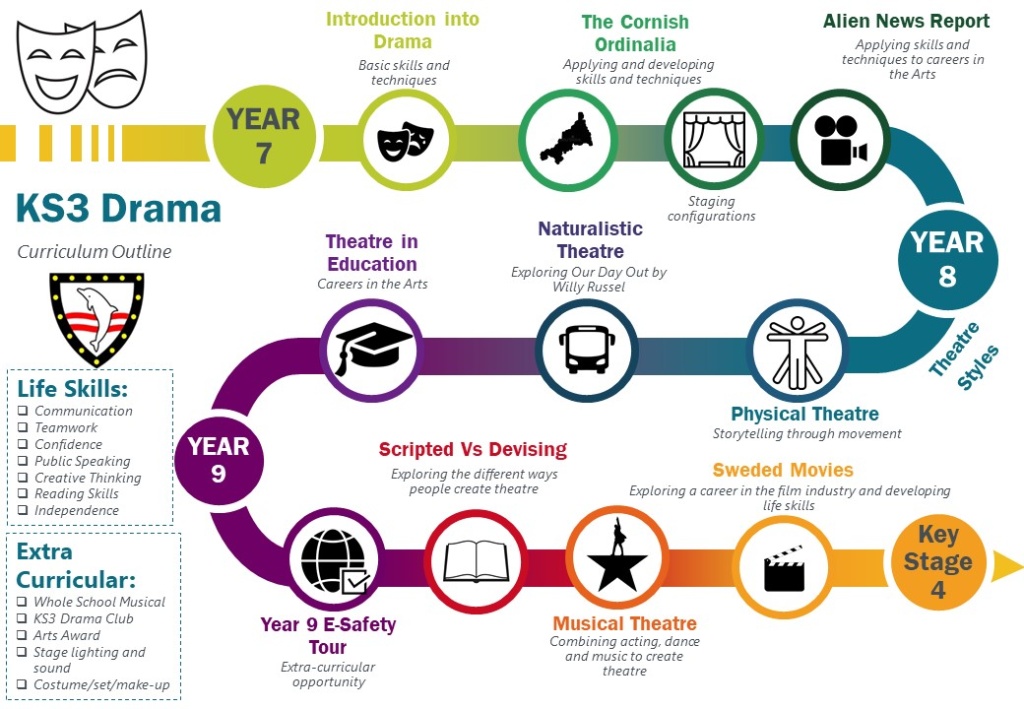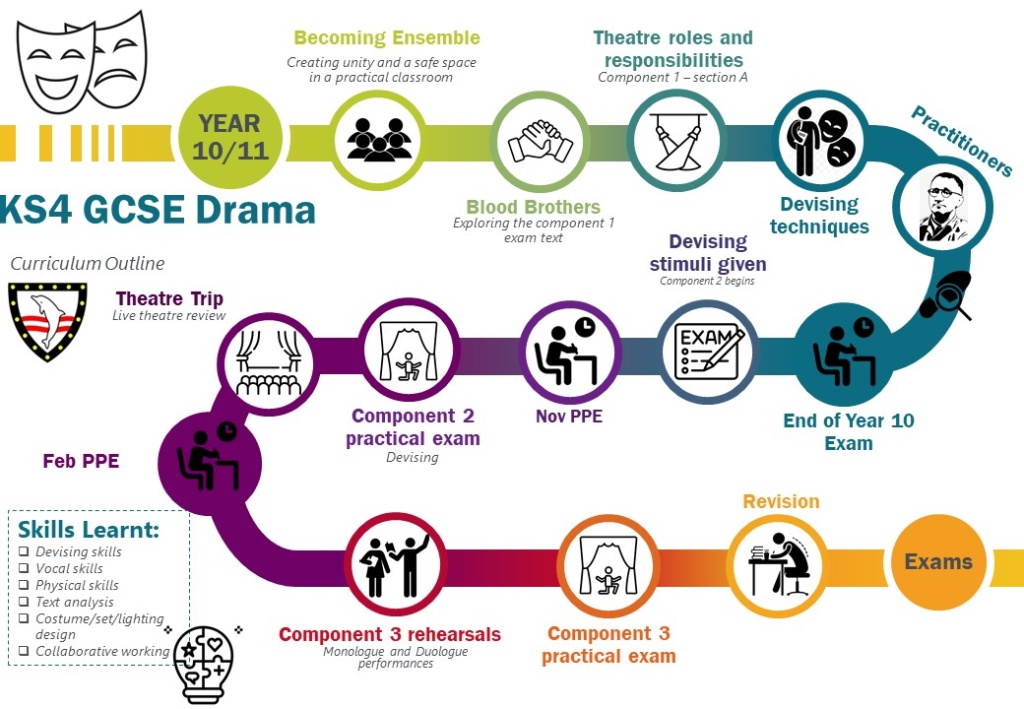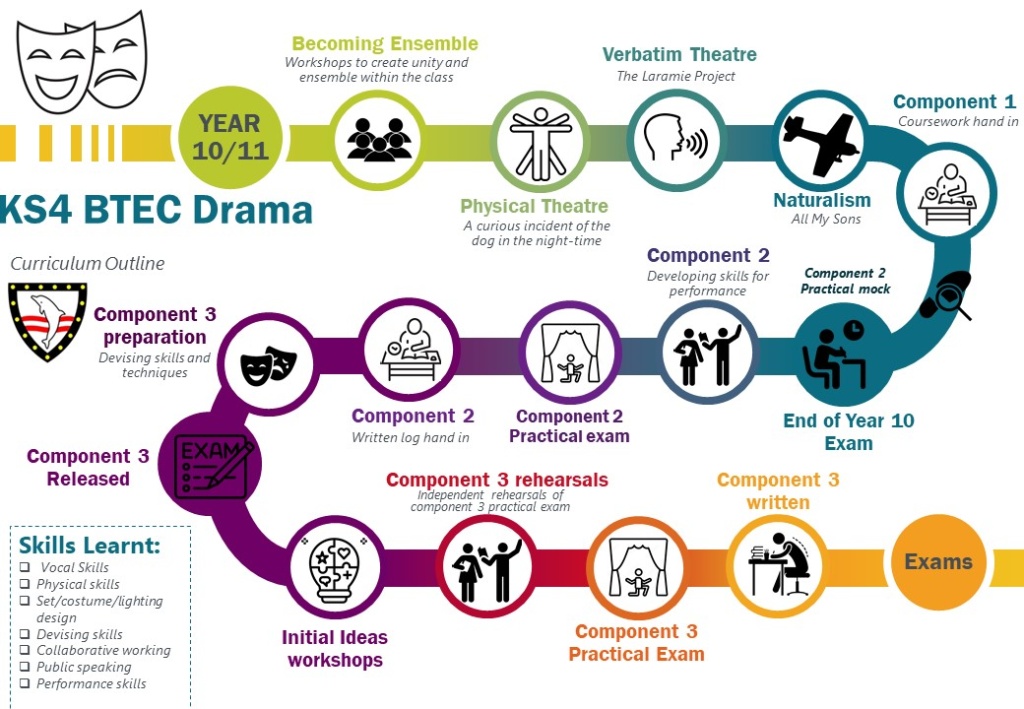Drama
The key skills developed in Drama are also ones which will contribute to the wider success of students. These include: creativity, teamwork, evaluation and performance through a range of contexts. To be successful in Drama will build wider confidence and social skills.
Our Drama curriculum is enhanced through having excellent, purpose built facilities, including two specialist Drama Studios with leading edge sound and lighting systems.
Beyond the curriculum, students have a range of opportunities to be involved in performance and enrichment activities. These include the various productions put on by the school, including the main school production. This year’s production of ‘Matilda – the Musical’ featured 2 casts and saw actors, dancers, musicians and technical crew impressing audiences with 4 outstanding, sold-out, performances! For more on extra curricular Drama please see the Creative Arts page in the Extra Curricular area.
There is also a range of theatre visits open to students, both to provincial theatres and to the West End.
All students have a weekly Drama lesson throughout Key Stage 3. Students are able to work in groups to devise and perform their pieces, within the studio environment of the Drama facilities.
The key skills developed in Drama are also ones which will contribute to the wider success of students. Students will learn skills in 5 strands:
- Devising – devising pieces, working together, rehearsing and directing
- Performing – performing work to the class; both individual and group pieces
- Responding – providing constructive feedback to others so they can improve, adapt and polish their work. Developing their knowledge of subject specific vocabulary.
- Production – lighting and sound technology, costume and set design.
- Life Skills – creativity, teamwork, evaluation and performance through a range of contexts
As a result, students enjoy increased confidence and self-esteem and this will benefit all aspects of their life. Indeed the ability to speak out, perform and work as part of a team is essential for most jobs.
Schemes of work encourage students to reflect on their place in the world; both locally and globally, and through role play they learn to empathise with the thoughts and feelings of others.
Topics include: Melodrama, Shakespeare, improvisation, building atmosphere, characterisation, script work, movement, stage craft skills, status, issue based work on truancy, child labour and peer pressure, news reports and adverts. Students will also be able to include props and costumes and make and evaluate short video pieces.
Year 7
In Year 7, students will learn the basic drama skills and techniques through a range of topics that will also develop both their ability to understand and empathise with others as well as develop crucial life skills such as teamwork and confidence. Students will begin to evaluate both their own and the work of others through self and peer feedback.
Year 8
In Year 8, students will revisit the knowledge they have learned and begin to build on this through the incorporation of more advanced drama skills and techniques such as physical theatre. They will also begin to apply these to wider context and repertoire and explore how we can understand and evaluate professional performance work as well as a playwright’s artistic intentions.
Year 9
In Year 9, students begin to explore the world of work in the performing arts. They will apply the knowledge they have gained over KS3 and begin to explore topics such as theatre in education and film making. By the end of KS3, students will have gained knowledge and developed skills in 4 strands: performing, devising, understanding and evaluating and life skills and have an understanding of how these skills can be applied in the real world.
A curriculum overview calendar for Years 7-11 Drama is available here
For additional information relating to the Drama curriculum at Key Stage 3 please email
Drama is a popular and successful GCSE subject and will add to students’ overall confidence and ability to work in teams and to perform, in a variety of contexts.
Drama is all about understanding what it is like to put yourself in somebody else’s shoes. You will play many parts in different imaginary situations. You will be asked to use both improvisation and script work in order to explore current issues and to create a working environment based on mutual trust and co- operation. You will develop a range of theatrical skills and there will be the opportunity to see professional theatre both in and outside school. The Drama specification is designed to give learners a broad and balanced experience of drama. The specification is designed to integrate knowledge and understanding of how drama and theatre is developed and performed across a range of dramatic activities.
In KS4, students will follow the AQA GCSE curriculum. Students will get the opportunity to revisit, apply and develop the skills they have learned in KS3 and apply these in three areas:
- Understanding drama
- Devising drama
- Text in practice.
The specification engages and encourages students to become confident performers and designers with the skills they need for a bright and successful future. In Year 10 we work on building collaborative skills for students who may have not worked together before. We do not enter any Year 10 students in for real exam components during this year however we have a walk and talk written paper mock alongside the school PPE timetable to build confidence and knowledge for the real thing in Year 11.
We introduce devising and script work in readiness for the exam components in Year 11. Students are encouraged to apply knowledge and understanding when making, performing and responding to drama. Students will:
- explore performance texts, understanding their social, cultural and historical context including the theatrical conventions of the period in which they were created
- develop a range of theatrical skills and apply them to create performance
- work collaboratively to generate, develop and communicate ideas
- develop as creative, effective, independent and reflective students who are able to make informed choices in process and performance
- contribute as an individual to a theatrical performance
- reflect on and evaluate their own work and that of others
- develop an awareness and understanding of the roles and processes undertaken in contemporary professional theatre practice
- adopt safe working practices.
A curriculum overview calendar for Years 7-11 Drama is available here
For additional information relating to the Drama curriculum at Key Stage 4 please email


